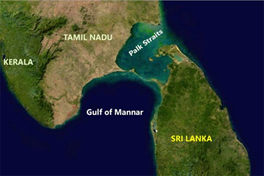

22nd July 2023 (7 Topics)
Context
As the Sri Lankan President was on a two-day visit to India, several agreements were signed between both the countries.
- The visit is significant as it was the first time a senior Sri Lankan leader visited India since Sri Lanka experienced a severe economic crisis last year.
Major-Points of Discussion:
- Strengthen economic and strategic cooperation: During the visit, the primary focus of the discussions between Indian Prime Minister and Sri Lankan President was to strengthen economic and strategic cooperation between the two nations.
- Increase Fintech connectivity: The Agreement signed to launch UPI in Sri Lanka to increase Fintech connectivity.
- Expanding scope of land accessibility: India and Sri Lanka agreed to conduct feasibility studies on a petroleum pipeline and a land bridge connectivity project between the two countries.
- On Fishermen Issue: Sri Lanka has promised to make amendments in their law regarding the fishing rights and territory.
|
India-Sri Lanka Fisherman Issue
|
India’s view on deal with Sri Lanka:
- Sri Lanka has an important place in both India's 'Neighbourhood First' policy and 'SAGAR' vision.
- India wants to expand the scope of digital payments between both the countries, bringing the use of UPI and similar tools to the forefront.
|
'Neighbourhood First' policy:
'SAGAR' vision:
|
Sri Lanka and its Strategic significance:
- Strategic Location: Sri Lanka occupies a geo-strategically important position as about two-thirds of the world’s oil and half of the world’s container transportation passes through the south of Sri Lanka.
- Therefore, Sri Lanka, which is strategically located, stands out in terms of the security of maritime communication and trade lines in the Indian Ocean.
- Positioned as an Island Nation: On the other hand, Sri Lanka is home to ports that have the potential to become important maritime hubs in the Indian Ocean.
- Economic Crisis: The crisis that is hampering Sri Lanka’s economic and political stability could have serious repercussions on India.
- Because Sri Lanka’s economic and therefore political dependence on China has led to an increase in Chinese influence in the country.
Conclusion:
On the radar of major powers such as Japan, the US, and the UK, as well as China and India, Sri Lanka has become a hub in the Indian Ocean. For this reason, the any support that Sri Lanka will receive from India and other countries is considered by many experts as a balance against China. On the other hand, it is also claimed that Sri Lanka could use its relations with China and its strategic position and importance to extract economic support and concessions from India. The adoption of such a strategy for the protection of a small and economically crisis country is considered quite rational.



